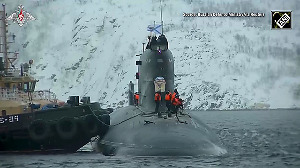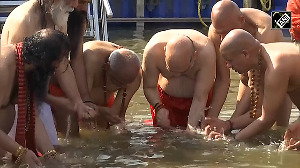
Circa 1939. A young K R Rajagopalan decides to become a police officer because he is enamoured of the uniform his brother-in-law wears.
Ironically, once Rajagopalan became a police officer, he hardly got a chance to wear the uniform; this most trusted officer was assigned the task of guarding, in mufti, the country's top dignitaries such as Lord Mountbatten and free India's first President and prime minister.
On completing his training, Rajagopalan, who hailed from Karapatti in Tiruchirappalli district of Tamil Nadu, was posted to Madurai under W F A Hamilton, then superintendent of police.
His integrity and sharpshooting skills caught Hamilton's eye. "I was a very good shot," remembers Rajagopalan, now 92. "I could shoot with both my left hand and right hand, and that too without taking aim. Whenever there was a shooting competition among police officers, I used to come first."
When Hamilton was transferred to Madras, he asked that Rajagopalan accompany him. And when Lord Mountbatten visited Madras just before Independence, Rajagopalan was chosen to be his personal bodyguard. "As he was there only for a few days, I did not come to know him much, and I was also not in very close contact with him. He was a very strict and handsome man, but his wife was not that good-looking. She was short compared to him."
 After Independence, India's first President, Dr Rajendra Prasad, paid a visit to Madras, and once more Rajagopalan was assigned the job of bodyguard. "One night, when he felt uneasy, he asked his staff to find out whether there was anybody who could recite the Ramayana to him. It was well known in Madras police circles that I was a scholar in Sanskrit and they immediately informed his staff about me.
After Independence, India's first President, Dr Rajendra Prasad, paid a visit to Madras, and once more Rajagopalan was assigned the job of bodyguard. "One night, when he felt uneasy, he asked his staff to find out whether there was anybody who could recite the Ramayana to him. It was well known in Madras police circles that I was a scholar in Sanskrit and they immediately informed his staff about me.
"Soon, I was ushered into his room. Dr Rajendra Prasad wanted to be left alone with me. He asked me, 'Do you know Sanskrit?' I said, 'Yes Sir.' He asked, 'Do you know the Ramayana?' I again said, 'Yes Sir.' I further told him, 'Sir, I know Ramayana only in Sanskrit and not in Hindi.'
"He then told me, 'I feel very uneasy. Please recite something from the Ramayana to me. What do you like in Ramayana?'
"I said, 'I like two things. One, Rama's love for his parents, and the other, love for his brothers.'
"Then, I started reciting the Ramayana to him. After I finished the recital, he asked me to go with him to Delhi. I said, 'Sir, I can't come because my parents are here and very old.' He just smiled. I recited the Ramayana for some more time, and he fell asleep."
Yet, destiny would send Rajagopalan to Delhi.
After working as the personal guard of the then chief minister of the Madras presidency, C Rajagopalachari, popularly known as Rajaji, for two years, Rajagopalan was sent to Delhi to serve as one of the bodyguards of Jawaharlal Nehru, India's first prime minister.
The reason for his transfer was an intelligence report that a gang planned to kill Nehru. Rajagopalan was chosen for his shooting skills. "And I was instructed to shoot any suspicious person at sight, but I didn't have to shoot at anyone."
 Rajagopalan worked as Nehru's bodyguard for two years. "Panditji was a lovely man," he recalls. "Very friendly too! I was only one among the many bodyguards he had. So my personal equation with him was not like what I had with Rajaji. After my request for a transfer back to Madras was granted, I went to Nehru and informed him that as my father was very old, I wanted to be with him during his last days. He said, 'Okay, you go to your father.'
Rajagopalan worked as Nehru's bodyguard for two years. "Panditji was a lovely man," he recalls. "Very friendly too! I was only one among the many bodyguards he had. So my personal equation with him was not like what I had with Rajaji. After my request for a transfer back to Madras was granted, I went to Nehru and informed him that as my father was very old, I wanted to be with him during his last days. He said, 'Okay, you go to your father.'
"I liked Nehru, but there was nobody quite like Rajagopalachari," Rajagopalan continues, his wrinkled face lighting up. "You will not find a person like Rajaji anymore. He was a perfect man. He had absolute faith and confidence in me. I was allowed to be with him even when very important discussions took place. If somebody wanted to talk to him privately, he would say, 'You can talk in front of him. He is a very honest and trustworthy man.'
"I also had the good fortune of travelling with him quite a few times in his own car. When Richard Nixon came to meet and talk to him, I was the only officer who was allowed to stand near him. He knew all the secrets would remain with me."
Even today, Rajagopalan stresses that whatever he had heard in his long years in service will go with him to his grave.
Having worked at close quarters with the giants of newly independent India, Rajagopalan refused to be the personal bodyguard for any other politician till his retirement in 1972. He neither wants to remember the days after Rajaji and Nehru nor comment on anyone who came after Rajaji!
"The leaders of today work only for themselves," is all that he is willing to say. "Let me quote Dr Samuel Johnson: Politics is the last refuge of a scoundrel."
Rajagopalan's photograph: Sreeram Selvaraj
Image: Rahil Shaikh






 © 2025
© 2025